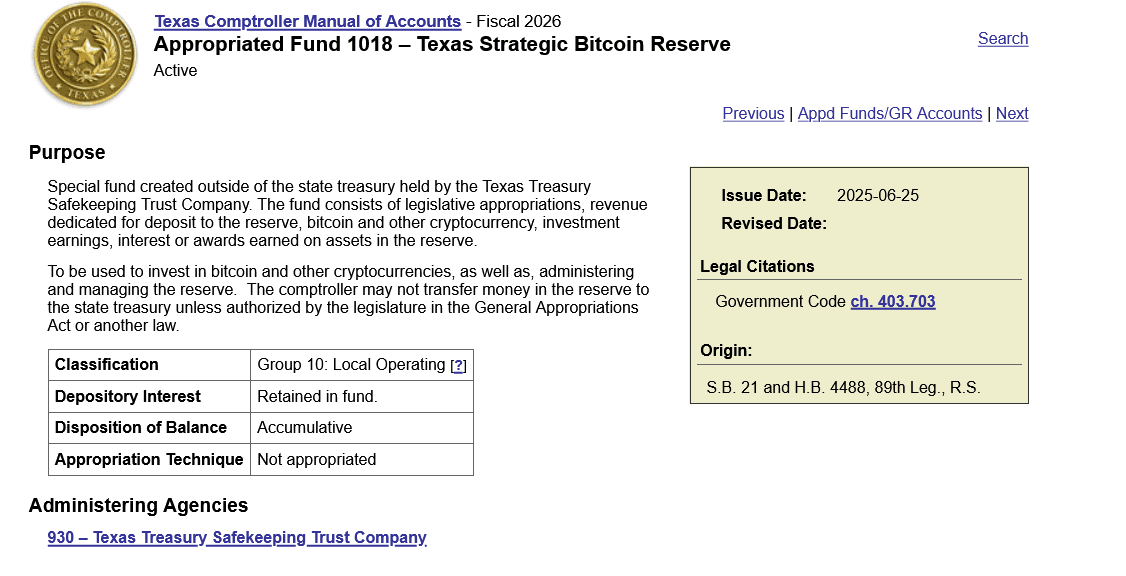Texas Spends $5 Million on Bitcoin. Here’s Why
Texas looks ready to become the first U.S. state to officially put bitcoin on its balance sheet. After months of talk and a new law backing the effort, the state has reportedly fired the starting shot with a $5 million purchase of BlackRock’s IBIT . It is the first step in a $10 million allocation approved earlier this year, and if confirmed, it marks a turning point in how governments treat digital assets.
Why Texas Is Buying Bitcoin Now

The purchase comes under SB 21 , the law signed by Governor Greg Abbott in June. The bill created the Texas Strategic Bitcoin Reserve, managed by the Texas Treasury Safekeeping Trust Company . Lawmakers behind SB 21 made their intent clear: they wanted bitcoin treated like any long-term asset in the state’s investment portfolio.
Senator Charles Schwertner, who authored the bill, put it bluntly earlier this year when he said the state should be free to consider “the best performing asset over the last 10 years.” Even though bitcoin has had volatile periods, its decade-long returns tell a different story. That pitch carried enough weight to secure a dedicated $10 million allocation.
The First Allocation: A $5 Million IBIT Purchase
According to posts from the Texas Blockchain Council, the state executed a roughly $5 million buy of BlackRock’s IBIT ETF on November 20. If accurate, this is the very first deployment from the bitcoin budget approved under SB 21.
It’s also a symbolic milestone: the council’s president, Lee Bratcher, called it the first-ever bitcoin purchase by a U.S. state . Official confirmation from Treasurer Kelly Hancock hasn’t landed yet, but the timing and details match the budget provisions and the authorization process.
What this really means is Texas isn’t waiting for national clarity. It’s moving ahead with its own blueprint for treating bitcoin as part of a sovereign-style reserve.
How Bitcoin Fits Into the Texas Portfolio
If this transaction is validated, IBIT becomes the third line item in the state’s traditional holdings. The Texas Treasury Safekeeping Trust Company currently reports roughly:
- $667 million in SPY
- $34 million in a Janus Henderson fund
- And now, potentially, a $5 million position in IBIT
It’s a small position in dollar terms, but symbolically, it’s a signal that digital assets are crossing into territory once reserved strictly for equities and bonds.
This is also a rare intersection of institutions. Abu Dhabi’s sovereign wealth fund added IBIT this month. Harvard owns nearly seven million shares and listed it as its largest U.S. holding as of September 30.
Bloomberg’s Eric Balchunas summed it up: IBIT may be the only ETF ever held by Texas, Harvard, and a Gulf sovereign wealth fund at the same time. Not bad for a fund that isn’t even two years old.
Why Everyone Is Watching Texas
Texas tends to move first and worry later, especially when it comes to energy, crypto mining, and financial experimentation. Its growing blockchain ecosystem, combined with political support, makes it a natural testing ground for state-level digital asset policy.
If this $5 million IBIT purchase is confirmed, it won’t stay a state secret for long. Other states will watch the performance, the governance model, and the political reaction. If the reserve grows and the returns justify the experiment, expect others to start asking why they’re sitting out.
This moment isn’t just about an ETF trade . It’s about whether bitcoin can graduate from speculative asset to state-level strategic asset.
Disclaimer: The content of this article solely reflects the author's opinion and does not represent the platform in any capacity. This article is not intended to serve as a reference for making investment decisions.
You may also like
Privacy Altcoins Surge While Crypto Markets Decline
In Brief Cryptocurrency markets faced a major downturn in recent weeks. Privacy altcoins like Zcash rise amidst stricter regulation concerns. Upcoming regulations pose liquidity risks for privacy-focused cryptocurrencies.

Solana News Today: Institutions Remain Confident in Solana Amid Security Concerns and Volatile Prices
- Solana's on-chain trading volume now exceeds centralized exchanges, driven by $510M in ETF inflows and institutional adoption of DeFi protocols. - Price volatility and security breaches, including Upbit's $36.8M Solana-based theft, highlight risks despite $3B+ in corporate treasury holdings. - Institutional capital continues to flow into Solana's ecosystem, with DWF Labs committing $75M to scalable DeFi infrastructure amid TVL recovery to $120B. - Forward Industries reports $668M unrealized losses as Sol

XRP News Today: XRP ETFs See Rapid Growth, Price Remains Flat—Will Increased Inflows Overcome Technical Barriers?
- XRP ETFs saw $164M inflows on Nov. 24, 2025, with Grayscale and Franklin Templeton launching new products amid rising institutional interest. - Price rebounded to $2.20 but remains range-bound below key technical levels, forming descending patterns despite ETF-driven liquidity gains. - Ripple's RLUSD stablecoin surged 56% in 30-day volume to $3.5B, now third-largest GENIUS Act-compliant stablecoin after USDC and PYUSD. - Analysts predict $5.05 by 2025 and $26.50 by 2030, but XRP's 16.95% drop from 30-day

SEC Considers Blockchain Stock Advancements as Concerns Over Conventional Market Stability Persist
- SEC plans to discuss tokenized stock regulations with major firms like Coinbase and BlackRock , aiming to modernize securities rules for blockchain-based finance. - Proposed "innovation exemption" seeks to fast-track crypto products but risks destabilizing traditional markets by creating valuation gaps and eroding investor protections. - WFE warns tokenized shares could disrupt market structure, while Nasdaq proposes unified order books with shared CUSIP identifiers to align with existing systems. - Regu

